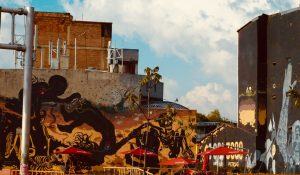Facing crisis, what road should Brazilian and Latin American philanthropy take?
29 May 2025
This blog originally appeared in Alliance magazine.
Amid a global surge in far-right and conservative movements, socio-environmental protections and human rights are facing unprecedented setbacks. In Brazil and beyond, this political shift is fueling a rollback of hard-won rights, intensifying attacks on marginalized groups, criminalizing civil society organizations, shrinking civic space, and triggering a sharp decline in international funding for advocacy and social justice efforts.

Graciela Hopstein, a 2024/2025 #ShiftThePower Fellow
Financing cuts to social and humanitarian aid have put organizations at a crisis point, as the measures taken immediately after President Trump’s inauguration interrupted, partially or entirely froze the operations of multilateral organizations such as the WHO (World Health Organization), UNFPA (United Nations Population Fund), and even USAID (United States Agency for International Development), and resulted in the United States’ withdrawal from various international agreements, including multilateral agreements like the Paris Agreement on climate change.
We do not know for sure what the concrete impact of these measures will be in the Brazilian, Latin American, and Global South contexts—but funding for civil society will unlikely never be the same. Ongoing cuts have resulted in a reduction of almost $75 billion.[1] The suspension of the US international cooperation has resulted in the closure of more than 60 global USAID offices and the defunding of thousands of humanitarian projects — over 5,000 grants and contracts were canceled, in addition to mass layoffs of staff — creating a vacuum in development aid in regions historically dependent on international resources like sub-Saharan Africa, Latin America and Asia. According to a survey conducted by CIVICUS, the most affected areas include health, civic engagement, human rights, humanitarian aid, well-being, economic development, education, legal advocacy, governance and gender equity.
Research conducted by SITAWI revealed that the estimated funding gap for Brazil is over $200 million.[2] For the 37 responding organizations[3] (that depend directly or indirectly on these resources), this funding source represents 34% of the 2025 budget. Certainly, small organizations are the most affected since more than 50% of their annual budgets can be compromised, increasing the risk of permanent shutdown and even the closure of their operations, jeopardizing the continuity of 80% of their employees.
Given the context of precariousness and fragility regarding political and financial sustainability in which civil Brazilian society organizations have historically operated, SITAWI´s research reveals that only 23% of organizations were prepared for an abrupt funding cut and nearly half (47%) have financial reserves for a maximum of only three months. Based on the scenario presented, it is possible to assert that considering Brazilian civil society’s dependence on international resources, the situation is taking on dramatic contours since the global funding crisis will force NGOs to diversify their resource mobilization strategies, seek new partners — as there will be greater competition for smaller funds — and readjust their agendas and modes of operation according to the strategic interests of donors. And the situation will become even more critical given the moment of democratic fragility we are experiencing, with the rise of conservative and authoritarian governments, the regression in the field of rights and fundamental freedoms, the restriction of civic spaces, the criminalization of protest, and the progress of the delegitimization of the role of civil society actors.
Crises abound. What are the possible strategies to ensure political and financial sustainability for civil society in a complex and challenging context?
Certainly, strengthening local funding and community philanthropy, including private social investment strategies, should be one of the priorities. In the case of Brazilian philanthropy, although it has a developed and diverse infrastructure, historically it has not been able to respond to the financing needs of local civil society. Although corporate and family foundations invest significantly in the social field — BRL $4.8 billion in 2022, according to the GIFE Census — these resources are mostly allocated to the development of their own programmes, and much less to support civil society organizations (around BRL $1.8 billion) with the agendas of social justice and human rights, defense of rights, culture of peace and democracy, and the institutional development of CSOs and social movements receiving the least donations. It is important to highlight the distinct role of independent Brazilian philanthropy[4] — composed of community funds and foundations, 18 of which are part of the Rede Comuá — in funding civil society, as the majority of them (74%) have been donating to grassroots organizations, social movements and collectives (formal or informal) led by political minorities (women, Indigenous peoples, Black people, the LGBTIQ+ community, etc.). However, this philanthropy will also suffer the impacts of the funding crisis, including compromising the flow and volume of donations transferred so far (in 2022 and 2023, these independent funds have donated nearly BRL $400 million to CSOs and social movements just for climate justice initiatives).
Based on this preliminary analysis, the political and funding scenario presents itself as challenging in the short, medium and long-terms. First, it is surprising to note the lack of discussions about the urgency of this agenda in the Brazilian civil society and philanthropy fields. Secondly, we must be attentive to the narratives that “justify” the cuts and observe how conservative sectors have been appropriating concepts such as localization and decolonization, distorting meanings and significance.[5]
Certainly, this situation will require that creative and bold solutions be thought of: both in the political field and in the realm of philanthropy and international cooperation. The establishment of new global articulation spaces — understood as permanent debate forums involving global, regional and local civil society networks and international philanthropy, with the aim of designing alternative financing models that favour the autonomy of CSOs and collective impact — should be another of the priority actions. Initiatives such as Wake up Philanthropy, Possible Now and Stand with Civil Society are understood as collective actions of resistance and advocacy, which at the same time imply a call to action, and the redefinition of narratives also becomes a fundamental strategy. In Latin America, there are also ongoing initiatives, such as Red Colaborar and the Reimagining the Future of Civil Society in LAC, led by RACI, among others.
As a current #ShiftThePower Fellow, my commitment is to analyze the connection between democracy and community philanthropy, understood as a strategy for strengthening civil society, an agenda that becomes urgent and a priority in the current political and funding crisis we are experiencing. Considering that representative democracy and the development and governance models established in the post-war period are going through a structural and multi-faceted crisis, strengthening civil society (communities and social movements) remains a fundamental and strategic action for consolidating democracy and building a more equal, just and inclusive society.
By: Graciela Hopstein, a 2024 / 2025 #ShiftThePower Fellow. She holds a master’s degree in education (UFF) and a PhD in Social Policy (UFRJ). Graciela is a consultant, professor and researcher in the social field. She was the Executive Director of Instituto Rio (2012 – 2016) and Rede Comuá (2017 – 2024).
- These cuts also involve the international cooperation agreements of Germany, France, Switzerland, United Kingdom and the Netherlands.
- Estimated value of resources from USAID and other U.S. agencies that will no longer reach Brazil.
- According to SITAWI, Finanças do Bem: “Although this sample does not represent the sector as a whole, it reflects a significantly impacted portion that faces urgent challenges and points to pathways for the future.”
- These are organizations that mobilize resources from diverse sources to donate to civil society.
- In the case of localization, for international financing perspective, it is a strategy which intends to transfer responsibilities to local actors (public and private) to deal with the crisis. In turn, the concept of decolonization is also framed in this same line, reinforcing the argument that, based on the funding cuts, international financing is aligned with the historical demands of the Global South insofar as for these sectors, the crisis is an opportunity for the countries to seek their own solutions to local problems, in an “independent” way, without the intervention of the great economic powers.


